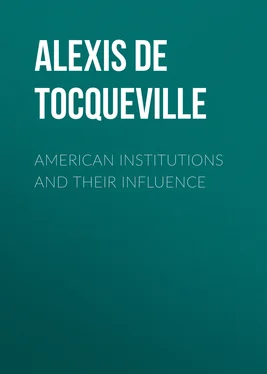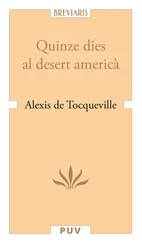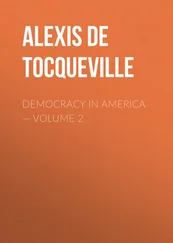Alexis de Tocqueville - American Institutions and Their Influence
Здесь есть возможность читать онлайн «Alexis de Tocqueville - American Institutions and Their Influence» — ознакомительный отрывок электронной книги совершенно бесплатно, а после прочтения отрывка купить полную версию. В некоторых случаях можно слушать аудио, скачать через торрент в формате fb2 и присутствует краткое содержание. Жанр: foreign_antique, Политика, foreign_edu, на английском языке. Описание произведения, (предисловие) а так же отзывы посетителей доступны на портале библиотеки ЛибКат.
- Название:American Institutions and Their Influence
- Автор:
- Жанр:
- Год:неизвестен
- ISBN:нет данных
- Рейтинг книги:5 / 5. Голосов: 1
-
Избранное:Добавить в избранное
- Отзывы:
-
Ваша оценка:
- 100
- 1
- 2
- 3
- 4
- 5
American Institutions and Their Influence: краткое содержание, описание и аннотация
Предлагаем к чтению аннотацию, описание, краткое содержание или предисловие (зависит от того, что написал сам автор книги «American Institutions and Their Influence»). Если вы не нашли необходимую информацию о книге — напишите в комментариях, мы постараемся отыскать её.
American Institutions and Their Influence — читать онлайн ознакомительный отрывок
Ниже представлен текст книги, разбитый по страницам. Система сохранения места последней прочитанной страницы, позволяет с удобством читать онлайн бесплатно книгу «American Institutions and Their Influence», без необходимости каждый раз заново искать на чём Вы остановились. Поставьте закладку, и сможете в любой момент перейти на страницу, на которой закончили чтение.
Интервал:
Закладка:
It could not ostensibly disclose itself in the laws of the colonies, which were still constrained to obey the mother country; it was therefore obliged to spread secretly, and to gain ground in the provincial assemblies, and especially in the townships.
American society was not yet prepared to adopt it with all its consequences. The intelligence of New England, and the wealth of the country to the south of the Hudson (as I have shown in the preceding chapter), long exercised a sort of aristocratic influence, which tended to limit the exercise of social authority within the hands of a few. The public functionaries were not universally elected, and the citizens were not all of them electors. The electoral franchise was everywhere placed within certain limits, and made dependant on a certain qualification, which was exceedingly low in the north, and more considerable in the south.
The American revolution broke out, and the doctrine of the sovereignty of the people, which had been nurtured in the townships, took possession of the state; every class was enlisted in its cause; battles were fought, and victories obtained for it; until it became the law of laws.
A scarcely less rapid change was effected in the interior of society, where the law of descent completed the abolition of local influences.
At the very time when this consequence of the laws and of the revolution became apparent to every eye, victory was irrevocably pronounced in favor of the democratic cause. All power was, in fact, in its hands, and resistance was no longer possible. The higher orders submitted without a murmur and without a struggle to an evil which was thenceforth inevitable. The ordinary fate of falling powers awaited them; each of their several members followed his own interest; and as it was impossible to wring the power from the hands of a people which they did not detest sufficiently to brave, their only aim was to secure its good-will at any price. The most democratic laws were consequently voted by the very men whose interests they impaired; and thus, although the higher classes did not excite the passions of the people against their order, they accelerated the triumph of the new state of things; so that, by a singular change, the democratic impulse was found to be most irresistible in the very states where the aristocracy had the firmest hold.
The state of Maryland, which had been founded by men of rank, was the first to proclaim universal suffrage, 61 61 See the amendments made to the constitution of Maryland in 1801 and 1809.
and to introduce the most democratic forms into the conduct of its government.
When a nation modifies the elective qualification, it may easily be foreseen that sooner or later that qualification will be entirely abolished. There is no more invariable rule in the history of society: the farther electoral rights are extended, the more is felt the need of extending them; for after each concession the strength of the democracy increases, and its demands increase with its strength. The ambition of those who are below the appointed rate is irritated in exact proportion to the great number of those who are above it. The exception at last becomes the rule, concession follows concession, and no stop can be made short of universal suffrage.
At the present day the principle of the sovereignty of the people has acquired, in the United States, all the practical development which the imagination can conceive. It is unencumbered by those fictions which have been thrown over it in other countries, and it appears in every possible form according to the exigency of the occasion. Sometimes the laws are made by the people in a body, as at Athens; and sometimes its representatives, chosen by universal suffrage, transact business in its name, and almost under its immediate control.
In some countries a power exists which, though it is in a degree foreign to the social body, directs it, and forces it to pursue a certain track. In others the ruling force is divided, being partly within and partly without the ranks of the people. But nothing of the kind is to be seen in the United States; there society governs itself for itself. All power centres in its bosom; and scarcely an individual is to be met with who would venture to conceive, or, still more, to express, the idea of seeking it elsewhere. The nation participates in the making of its laws by the choice of its legislators, and in the execution of them by the choice of the agents of the executive government; it may almost be said to govern itself, so feeble and so restricted is the share left to the administration, so little do the authorities forget their popular origin and the power from which they emanate. 62 62 See Appendix H.
CHAPTER V
NECESSITY OF EXAMINING THE CONDITION OF THE STATES BEFORE THAT OF THE UNION AT LARGE
It is proposed to examine in the following chapter, what is the form of government established in America on the principle of the sovereignty of the people; what are its resources, its hindrances, its advantages, and its dangers. The first difficulty which presents itself arises from the complex nature of the constitution of the United States, which consists of two distinct social structures, connected, and, as it were, encased, one within the other; two governments, completely separate, and almost independent, the one fulfilling the ordinary duties, and responding to the daily and indefinite calls of a community, the other circumscribed within certain limits, and only exercising an exceptional authority over the general interests of the country. In short, there are twenty-four small sovereign nations, whose agglomeration constitutes the body of the Union. To examine the Union before we have studied the states, would be to adopt a method filled with obstacles. The Federal government of the United States was the last which was adopted; and it is in fact nothing more than a modification or a summary of these republican principles which were current in the whole community before it existed, and independently of its existence. Moreover, the federal government is, as I have just observed, the exception; the government of the states is the rule. The author who should attempt to exhibit the picture as a whole, before he had explained its details, would necessarily fall into obscurity and repetition.
The great political principles which govern American society at this day, undoubtedly took their origin and their growth in the state. It is therefore necessary to become acquainted with the state in order to possess a clew to the remainder. The states which at present compose the American Union, all present the same features as far as regards the external aspect of their institutions. Their political or administrative existence is centred in three foci of action, which may not inaptly be compared to the different nervous centres which convey motion to the human body. The township is in the lowest order, then the county, and lastly the state; and I propose to devote the following chapter to the examination of these three divisions.
THE AMERICAN SYSTEM OF TOWNSHIPS AND MUNICIPAL BODIES. 63 63 It is by this periphrasis that I attempt to render the French expressions " Commune " and " Système Communal ." I am not aware that any English word precisely corresponds to the general term of the original. In France every association of human dwellings forms a commune , and every commune is governed by a maire and a conseil municipal . In other words, the mancipium or municipal privilege, which belongs in England to chartered corporations alone, is alike extended to every commune into which the cantons and departments of France were divided at the revolution. Thence the different application of the expression, which is general in one country and restricted in the other. In America, the counties of the northern states are divided into townships, those of the southern into parishes; besides which, municipal bodies, bearing the name of corporations, exist in the cities. I shall apply these several expressions to render the term commune . The term "parish," now commonly used in England, belongs exclusively to the ecclesiastical division; it denotes the limits over which a parson's ( personae ecclesiae or perhaps parochianus ) rights extend.— Translator's Note .
Интервал:
Закладка:
Похожие книги на «American Institutions and Their Influence»
Представляем Вашему вниманию похожие книги на «American Institutions and Their Influence» списком для выбора. Мы отобрали схожую по названию и смыслу литературу в надежде предоставить читателям больше вариантов отыскать новые, интересные, ещё непрочитанные произведения.
Обсуждение, отзывы о книге «American Institutions and Their Influence» и просто собственные мнения читателей. Оставьте ваши комментарии, напишите, что Вы думаете о произведении, его смысле или главных героях. Укажите что конкретно понравилось, а что нет, и почему Вы так считаете.












